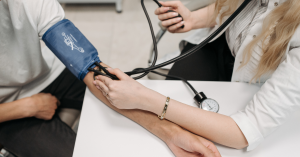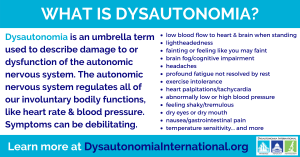An Estimated 38 Million Americans Have Developed an Autonomic Nervous System Disorder Following COVID-19 Infection
New research from Stanford University and Stony Brook University identifies moderate to severe dysautonomia in 67% of Long COVID patients.
"Identifying dysautonomia in Long COVID is important because the autonomic nervous system plays a critical role in regulating immune function, inflammation, coagulation pathways, fatigue, exercise intolerance, cognition, and other factors that appear to play a role in Long COVID. Treatments that improve autonomic nervous system function may offer great benefit in treating the debilitating symptoms of Long COVID," explains Dr. Mitchell Miglis, Associate Professor of Neurology & Neurological Sciences at Stanford University.
Prior to COVID, the average diagnostic delay experienced by patients with postural orthostatic tachycardia syndrome (POTS), the most common form of dysautonomia presenting in Long COVID patients, was nearly five years. Most doctors don’t receive adequate training on dysautonomia during medical school, resulting in very few dysautonomia specialists, long diagnostic delays and difficulty accessing care. There are only 52 doctors in the US who are board certified in autonomic disorders and fewer than 50 dysautonomia specialty centers throughout the US equipped to diagnose, treat and study dysautonomia. Those centers are currently overwhelmed with new onset Long COVID dysautonomia patients. Many centers are turning away new and even existing dysautonomia patients because their clinics are over capacity.
"We need the National Institutes of Health to immediately address this crisis and begin funding research aimed at developing effective treatments for Long COVID dysautonomia,” says Jacqueline Rutter, a Dysautonomia International Board Member whose family has been impacted by Long COVID. ”Additionally, the Center for Disease Control, state and county health agencies, and medical schools need to rapidly train clinicians, especially staff at Long COVID clinics, on how to diagnose and treat post-viral dysautonomias."
Dysautonomia International's 10th Annual Conference, Collaborating for Cures, is being held virtually July 14-17, and will offer over 50 educational lectures from the top dysautonomia and Long COVID experts from Stanford, Harvard, Johns Hopkins, Mayo Clinic and beyond. We encourage patients, caregivers and medical professionals to join us to learn about the cutting-edge research and treatment approaches for Long COVID and dysautonomia. Visit dysautonomiainternational.org/dysconf2022 for more information.
Dysautonomia International launched the Long COVID Research Fund (longcovidresearchfund.org) in 2021 to support the effort to uncover the pathology of Long COVID dysautonomia and develop effective treatments. To date, the organization has funded Long COVID dysautonomia related studies at Stanford University, the University of Toledo, and the Karolinska Institute in Sweden, as well as millions of dollars of dysautonomia research unrelated to COVID.
About Dysautonomia International:
Dysautonomia International is a 501(c)(3) nonprofit based in New York with a global reach. Founded in 2012, Dysautonomia International is the leading global patient advocacy organization that seeks to improve the lives of over 70 million people living with autonomic nervous system disorders, collectively known as dysautonomia, through research, clinician education, public awareness and patient empowerment programs.
Study link: https://www.medrxiv.org/content/10.1101/2022.04.25.22274300v1.full.pdf+html
Lauren Stiles
Dysautonomia International
+1 631-202-1720
press@dysautonomiainternational.org
Visit us on social media:
Facebook
Twitter
LinkedIn
Other
Autonomic Dysfunction in Long COVID
Legal Disclaimer:
EIN Presswire provides this news content "as is" without warranty of any kind. We do not accept any responsibility or liability for the accuracy, content, images, videos, licenses, completeness, legality, or reliability of the information contained in this article. If you have any complaints or copyright issues related to this article, kindly contact the author above.



